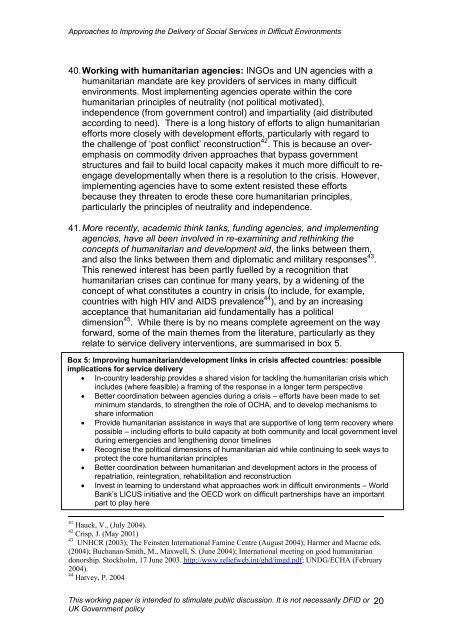Approaches to Improving the Delivery of Social Services in Difficult ...
Approaches to Improving the Delivery of Social Services in Difficult ...
Approaches to Improving the Delivery of Social Services in Difficult ...
You also want an ePaper? Increase the reach of your titles
YUMPU automatically turns print PDFs into web optimized ePapers that Google loves.
<strong>Approaches</strong> <strong>to</strong> <strong>Improv<strong>in</strong>g</strong> <strong>the</strong> <strong>Delivery</strong> <strong>of</strong> <strong>Social</strong> <strong>Services</strong> <strong>in</strong> <strong>Difficult</strong> Environments40. Work<strong>in</strong>g with humanitarian agencies: INGOs and UN agencies with ahumanitarian mandate are key providers <strong>of</strong> services <strong>in</strong> many difficultenvironments. Most implement<strong>in</strong>g agencies operate with<strong>in</strong> <strong>the</strong> corehumanitarian pr<strong>in</strong>ciples <strong>of</strong> neutrality (not political motivated),<strong>in</strong>dependence (from government control) and impartiality (aid distributedaccord<strong>in</strong>g <strong>to</strong> need). There is a long his<strong>to</strong>ry <strong>of</strong> efforts <strong>to</strong> align humanitarianefforts more closely with development efforts, particularly with regard <strong>to</strong><strong>the</strong> challenge <strong>of</strong> ‘post conflict’ reconstruction 42 . This is because an overemphasison commodity driven approaches that bypass governmentstructures and fail <strong>to</strong> build local capacity makes it much more difficult <strong>to</strong> reengagedevelopmentally when <strong>the</strong>re is a resolution <strong>to</strong> <strong>the</strong> crisis. However,implement<strong>in</strong>g agencies have <strong>to</strong> some extent resisted <strong>the</strong>se effortsbecause <strong>the</strong>y threaten <strong>to</strong> erode <strong>the</strong>se core humanitarian pr<strong>in</strong>ciples,particularly <strong>the</strong> pr<strong>in</strong>ciples <strong>of</strong> neutrality and <strong>in</strong>dependence.41. More recently, academic th<strong>in</strong>k tanks, fund<strong>in</strong>g agencies, and implement<strong>in</strong>gagencies, have all been <strong>in</strong>volved <strong>in</strong> re-exam<strong>in</strong><strong>in</strong>g and reth<strong>in</strong>k<strong>in</strong>g <strong>the</strong>concepts <strong>of</strong> humanitarian and development aid, <strong>the</strong> l<strong>in</strong>ks between <strong>the</strong>m,and also <strong>the</strong> l<strong>in</strong>ks between <strong>the</strong>m and diplomatic and military responses 43 .This renewed <strong>in</strong>terest has been partly fuelled by a recognition thathumanitarian crises can cont<strong>in</strong>ue for many years, by a widen<strong>in</strong>g <strong>of</strong> <strong>the</strong>concept <strong>of</strong> what constitutes a country <strong>in</strong> crisis (<strong>to</strong> <strong>in</strong>clude, for example,countries with high HIV and AIDS prevalence 44 ), and by an <strong>in</strong>creas<strong>in</strong>gacceptance that humanitarian aid fundamentally has a politicaldimension 45 . While <strong>the</strong>re is by no means complete agreement on <strong>the</strong> wayforward, some <strong>of</strong> <strong>the</strong> ma<strong>in</strong> <strong>the</strong>mes from <strong>the</strong> literature, particularly as <strong>the</strong>yrelate <strong>to</strong> service delivery <strong>in</strong>terventions, are summarised <strong>in</strong> box 5.Box 5: <strong>Improv<strong>in</strong>g</strong> humanitarian/development l<strong>in</strong>ks <strong>in</strong> crisis affected countries: possibleimplications for service delivery• In-country leadership provides a shared vision for tackl<strong>in</strong>g <strong>the</strong> humanitarian crisis which<strong>in</strong>cludes (where feasible) a fram<strong>in</strong>g <strong>of</strong> <strong>the</strong> response <strong>in</strong> a longer term perspective• Better coord<strong>in</strong>ation between agencies dur<strong>in</strong>g a crisis – efforts have been made <strong>to</strong> setm<strong>in</strong>imum standards, <strong>to</strong> streng<strong>the</strong>n <strong>the</strong> role <strong>of</strong> OCHA, and <strong>to</strong> develop mechanisms <strong>to</strong>share <strong>in</strong>formation• Provide humanitarian assistance <strong>in</strong> ways that are supportive <strong>of</strong> long term recovery wherepossible – <strong>in</strong>clud<strong>in</strong>g efforts <strong>to</strong> build capacity at both community and local government leveldur<strong>in</strong>g emergencies and leng<strong>the</strong>n<strong>in</strong>g donor timel<strong>in</strong>es• Recognise <strong>the</strong> political dimensions <strong>of</strong> humanitarian aid while cont<strong>in</strong>u<strong>in</strong>g <strong>to</strong> seek ways <strong>to</strong>protect <strong>the</strong> core humanitarian pr<strong>in</strong>ciples• Better coord<strong>in</strong>ation between humanitarian and development ac<strong>to</strong>rs <strong>in</strong> <strong>the</strong> process <strong>of</strong>repatriation, re<strong>in</strong>tegration, rehabilitation and reconstruction• Invest <strong>in</strong> learn<strong>in</strong>g <strong>to</strong> understand what approaches work <strong>in</strong> difficult environments – WorldBank’s LICUS <strong>in</strong>itiative and <strong>the</strong> OECD work on difficult partnerships have an importantpart <strong>to</strong> play here41 Hauck, V., (July 2004).42 Crisp, J. (May 2001)43 UNHCR (2003); The Fe<strong>in</strong>sten International Fam<strong>in</strong>e Centre (August 2004); Harmer and Macrae eds.(2004); Buchanan-Smith, M., Maxwell, S. (June 2004); International meet<strong>in</strong>g on good humanitariandonorship. S<strong>to</strong>ckholm, 17 June 2003. http://www.reliefweb.<strong>in</strong>t/ghd/imgd.pdf; UNDG/ECHA (February2004).44 Harvey, P. 2004This work<strong>in</strong>g paper is <strong>in</strong>tended <strong>to</strong> stimulate public discussion. It is not necessarily DFID orUK Government policy20
















